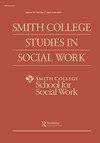从边缘到中心:用社会工作实践培养集体疗愈
IF 0.9
Q2 SOCIAL WORK
引用次数: 0
摘要
摘要黑人、原住民和有色人种女性(BIWOC)教育工作者在以白人为主的教育机构(PWIs)中不成比例地经历了根植于历史、结构和人际压迫的暴力,这些暴力对身心健康产生了负面影响,需要多层次的治疗。作为回应,BIWOC教育工作者的治疗圈结合了关键转化潜力发展(CTPD),创造了一个集体和协作的治疗过程,以消除制度性性别种族主义的危害。BIWOC圈子整合了非殖民战略,包括讲故事和治疗空间,以鼓励培养可持续的健康和保健做法。通过四位BIWOC治疗圈参与者的反思叙述,我们认为CTPD可以成为一股非殖民化力量。参与者的叙述支持社会工作实践(SWP)的引入,以及它从CTPD演变而来,作为灵魂护理、转化和治疗的非殖民化理论框架,宣称反叛是我们的救赎,社区是我们的保护,治疗是我们的解放。参与者反思中的SWP维度突出了我们人性的支柱:空间、优雅、时间和机会。在社会工作教育、研究和实践中更广泛应用的考虑也被提出。关键词:非裔美国人;批判意识;非殖民化;干预;“全球多数”“指的是黑人、亚洲人、棕色人种、双重遗产、全球南方的土著居民,或者被种族化为‘少数民族’的人”(Campbell-Stephens, Citation2020, p. 1)。内容完全是作者的责任,并不一定代表PSC-CUNY的官方观点。本文章由计算机程序翻译,如有差异,请以英文原文为准。
From the Margins to the Center: Cultivating Collective Healing with Soulcial Work Praxis
ABSTRACTBlack, Indigenous, and Women of Color (BIWOC) educators working in predominantly White institutions (PWIs) disproportionately experience violence rooted in historical, structural, and interpersonal oppressions that negatively impact mental and physical health which necessitates multi-level healing. In response, a BIWOC educators’ healing circle incorporated Critical Transformative Potential Development (CTPD) to create a collective and collaborative healing process from the harm of institutional gendered racism. The BIWOC circle integrated decolonial strategies, including storytelling and healing spaces, to encourage the cultivation of sustainable health and wellness practices. Through the reflective narratives of four BIWOC healing circle participants, we consider the ways CTPD can be a decolonizing force. Participant narratives support the introduction of Soulcial Work Praxis (SWP), and its evolution from CTPD, as a decolonizing theoretical framework for soul care, transformation, and healing, proclaiming that rebellion is our salvation, community is our protection, and healing is our liberation. The SWP dimensions within participants’ reflections highlight our pillars of humanity: space, grace, time, and opportunity. Considerations for broader application in social work education, research, and practice are also presented.KEYWORDS: African Americancritical consciousnesshealingdecolonizationinterventionwomen of color Disclosure statementNo potential conflict of interest was reported by the author(s).Notes1. “Global Majority” “refers to people who are Black, Asian, Brown, dual-heritage, indigenous to the global south, and or have been racialised as ’ethnic minorities’” (Campbell-Stephens, Citation2020, p. 1).Additional informationFundingThis research was supported by the PSC-CUNY Enhanced grant award. The content is solely the responsibility of the authors and does not necessarily represent the official views of PSC-CUNY.
求助全文
通过发布文献求助,成功后即可免费获取论文全文。
去求助
来源期刊

SMITH COLLEGE STUDIES IN SOCIAL WORK
SOCIAL WORK-
CiteScore
1.50
自引率
10.00%
发文量
10
期刊介绍:
Smith College Studies in Social Work focuses on the vital issues facing practitioners today, featuring only those articles that advance theoretical understanding of psychological and social functioning, present clinically relevant research findings, and promote excellence in clinical practice. This refereed journal addresses issues of mental health, therapeutic process, trauma and recovery, psychopathology, racial and cultural diversity, culturally responsive clinical practice, intersubjectivity, the influence of postmodern theory on clinical practice, community based practice, and clinical services for specific populations of psychologically and socially vulnerable clients.
 求助内容:
求助内容: 应助结果提醒方式:
应助结果提醒方式:


